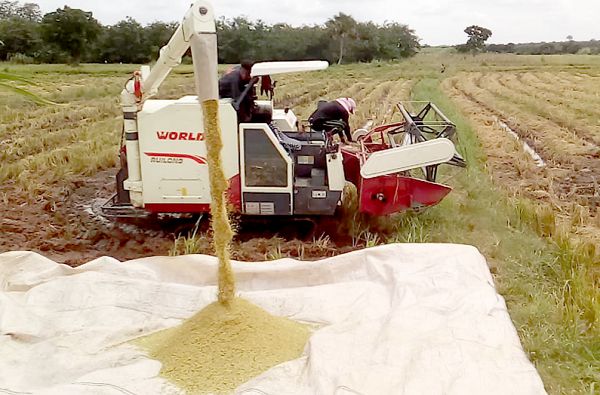
Volta Region produces 50% of local rice
The Volta Region can overtake the rest of Ghana in rice production in the next seven years and even become the sole producer of the staple to feed the country.
The region continues to be at the forefront of rice production in Ghana, averagely contributing over 50 per cent of the produce to the national stock of about 400,000 tonnes annually.
According to figures obtained from the Regional Agriculture Department, the Volta Region in 2017 produced 270,676 tonnes of rice which later increased by 29,218 tonnes in 2018.
![]()
Bags of rice at the farm gate
Favourable Ecology
A favourable topography, comprising undulating landscape produces streams that flow through the region’s inland valleys and ultimately serves as sources of water for rice cultivation.
The ecology of the area provides good opportunity for rice production along the coastal areas of especially North Tongu, which has water, a natural resource that presents a boost in the agricultural activities.
According to Mr Delali Nutsukpo, the Regional Director at the Ministry of Food and Agriculture, rice in the Volta Region had become an important food crop because of the availability of technical and extension inputs from numerous rice projects aimed at promoting its production.
Projects such as the Afife Irrigation and Aveyime Rice projects have enabled people around those areas to produce more in addition to their already existing rice production due to their traditional attachments to rice production.
The areas produce two crops per year because of a favourable climatic condition which is absent elsewhere.
“As we speak now, people have prepared the land for rice production and they will harvest in May/June and in September, they will prepare for another season,” Mr Nutsukpo said.
![]()
Rice being dried before dehusking
The rice capital
Ketu North with its 123,160 population, is meanwhile a leading rice producing district in the Volta Region.
About 54, 610 tonnes of rice was produced in the district for 2018 which is an increase of over 15 per cent from the previous year.
A total of 3,107 hectares of rice was cultivated in 2019 leaving about 4,650 hectares more of land in 14 other valleys to be cultivated including the Kplikpa, Tsiyi, Gali, Kpli (Adidome, Agblodomi, Kpeyiborkorpe, Awalavi, etc), Agortor, and many others.
The Municipal Chief Executive for the area, Mr Anthony Kobla Agblordor, said already the government had provided a storage warehouse to complement export efforts in the future (2022) when the ban on rice importation into Ghana would be imposed.
“For investors who would want to go into rice production and large exportation of rice, Ketu North is the right place to come and invest, so that importation of rice becomes a thing of the past,” he added.
The warehouse though completed, has not been functional due to the absence of electricity.
![]()
Inside a rice mill
Special Rice Initiative
Mr Nutsukpo has in the meantime attributed the region’s success stories to the government’s Special Rice Initiative under the Planting for Food and Jobs programme, to put a special focus on rice production and to boost its exportation.
Farmers, including those in parts of Hohoe and Kpando, according to him, were being supported by the agricultural extension sector while taking delivery of distributed seed crops and fertilisers.
![]()
A rice field in the Volta Region
Challenges
Although the ‘Eat Ghana Rice’ campaign is touted as successful, there still exists continuous preference for foreign perfumed rice. The phenomenon is hurting local farmers economically, with some calling for a stepped-up effort towards increasing the consumption of local rice in a bid to encourage farmers to produce more.
In many rice producing areas of the Volta Region, the tedious manual techniques of harvesting which are fading away in other places, are still being employed at the commercial level.
There are also challenges with rice milling in the country. The existing mills are not able to grade the rice in order to achieve 100 per cent purity. There has, however, been a call for the procurement of mills that can grade the locally produced crop which will enable local farmers to rub shoulders with their international counterparts.
The formation of farmer groups also remains a key challenge. Regional Extension Officer, Ms Theresa Akuba Nyamekye, expressed concern that efforts to collaborate with robust farmer groupings in the regions would remain a daunting task.
This is because several attempts for the formation of the groups have been met with farmer migrations without an appreciation of the benefits such groupings stand to gain.
Commenting on the situation, Mr Nutsukpo said, “agriculture has no alternative and holds the key to the sovereignty of the state. The government will do its best for the sector to develop but that does not mean you as an individual would not make any effort.”
With its annual 50 per cent contribution to the country’s rice stock, the Volta Region is currently producing an annual increment of 20,000 tonnes more of the staple, which could favourably position it as the sole producer of rice to feed the country.
